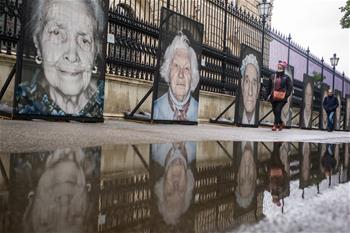UNITED NATIONS, May 17 (Xinhua) -- UN Undersecretary-General for Humanitarian Affairs and Emergency Relief Coordinator Mark Lowcock on Friday warned that the recent intensification of hostilities in Syria is unleashing a humanitarian nightmare.
Updating the UN Security Council on the situation in northwest Syria, Lowcock said the last three weeks have seen "a deadly escalation of the conflict." "Despite our warnings, our worst fears are now coming true."
According to Lowcock, the United Nations estimated that 3 million people live in the area of the de-escalation zone in the northwest of the country.
Even before the recent escalation, these were among the most vulnerable people in Syria, particularly the million children, and the 1.3 million people who have fled to Idlib from other parts of the country, he added.
Idlib, the last major rebel stronghold in Syria, is controlled by the Hayat Tahrir al-Sham (HTS), the umbrella group of the al-Qaida-linked Nusra Front.
Since mid-April, there has been an intensification of hostilities in Idlib, which is one of the four "de-escalation" areas agreed by the Astana guarantors -- Russia, Iran and Turkey -- in 2017.
In the last three weeks UN reports showed that up to 160 people have been killed. At least 180,000 people have been displaced, and millions of people are crammed into an ever smaller area, said Lowcock.
Lowcock said that he is most of all concerned about the number of attacks damaging or destroying medical facilities.
Since April 28, World Health Organization (WHO) and health actors have identified at least 18 health facilities that have been damaged or destroyed by air strikes, shelling or other fighting. All of them are inside the "so-called de-escalation zone," he added. "The trend has continued, day after day."
According to Lowcock, a total of 49 health facilities have partially or totally suspended activities. They have provided an average each month of at least 171,000 medical outpatient consultations and 2,760 major surgical operations, and now "they are not doing those things."
Concluding his briefing, Lowcock mentioned a list of questions from parties concerned including whether the Security Council passed a resolution reinforcing that countries shouldn't bomb hospitals.
"Yes. Security Council Resolution 2286, passed in 2016, specifically covered that," he answered. "Finally, I am asked: What is the point of the Security Council passing resolutions like that if States are not going to comply with them?"

















